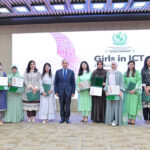ISLAMABAD, Aug 06 (APP): The USAID-funded Higher Education System Strengthening Activity (HESSA) has organized a three-day annual capacity building and knowledge-sharing summit.
The summit was organized to bring together 15 HESSA partner universities’ representatives to strengthen the structure and mechanisms for students support services in their respective institutions.
HESSA is a USAID-funded project partnering with the government of Pakistan to improve Pakistan’s higher education system in a bid to increase the employability of university graduates.
The inaugural session was attended by Anne Flaker, Director Education Office, USAID, alongside Dr. Habib Ali Bokhari, Vice Chancellor, Kohsar University, Murree. Dr. Nadeem Ul Haque, Vice Chancellor, Pakistan Institute of Development Economics (PIDE), was the keynote speaker.
The summit, which marked the launch of HESSA’s students support services initiative, engaged over 80 representatives from partner universities representing all provinces of Pakistan.
The group constituted deans, directors, managers, faculty members, and administrative officers working with students support services or managing student affairs in their respective universities in one of the six thematic areas—Financial Aid, Career Readiness, Student Leadership and Co-Curriculars; Alumni Engagement and Development; Student Entrepreneurship; and Mental Health and Psychosocial Well-being.
Delivering the keynote remarks, Dr. Nadeem Ul Haque, Vice Chancellor, PIDE, highlighted the need for a paradigm shift, with a focus on empowering students to unleash their innovative skills rather than restricting them to traditional classroom learning.
He appreciated HESSA and its interventions for improvement of the higher education ecosystem. “The best university is one that empowers you to thinker, to grow, and to innovate; mere book-learning gets you nowhere,” he said.
Dr. Bokhari emphasized the need to create linkages with the industry to produce an employable workforce. “We need to bridge the gap between the industry and the university to produce skillful and employable youth, and this can only happen when the teachers, trainers and master trainers have access to knowledge and practical know-how,” he added.
Shaza Fatima Khawaja, Special Advisor to the Prime Minister on Youth Affairs, addressed the participants via video-link on behalf of the Government of Pakistan. She highlighted government’s initiatives to produce skilled workforce through PM’s loan schemes, skills program, and the laptop schemes.
US-based resource persons from the University of Utah and the Institute of International Education (IIE) facilitated the summit. Woven around the six thematic areas, the discourse teed-off with dissemination of the findings of PIDE, which recently conducted a HESSA-commissioned needs assessment on the status of students support services across Pakistan as well as in HESSA’s 15 partner universities.
Here onwards, the participants will develop strategic plans and initiatives for their institutions across the lifecycle of the HESSA project and beyond.
The HESSA project seeks to enhance the support services available to students during and after their time at universities. It is working with university staff to develop and implement initiatives that will foster soft skills development for better student employability, improve student access to financial aid and scholarships, strengthen on-campus engagement services like career support, enhance networks and community engagement with student development activities, develop alumni support services, and foster an enabling environment for student entrepreneurship.
The summit concluded with award of certificates to the participants.





